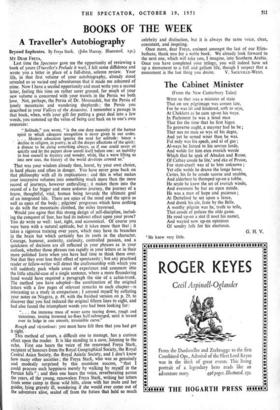BOOKS OF THE WEEK
A Traveller's Autobiography
Last time the Spectator gave me the opportunity of reviewing a book of yours (Traveller's Prelude it was), I felt some diffidence and wrote you a letter in place of a full-dress, solemn review. Your life, in that first volume of your autobiography, already stood revealed as so varied and adventurous that it made me ashamed of mine. Now I have a second-opportunity and must write you a second letter, feeling this time on rather surer ground, for much of your new volume is concerned with your travels. in the Persia we both love. Not, perhaps, the Persia of Dr. Moussadek, but the Persia of lonely mountains and wandering shepherds ; the Persia you described in your Valleys of the Assassins. I remember a passage in that book, when, with your gift for putting a great deal into a few words, you summed up the value of being cast back on to one's own resources: " Solitude," you wrote, " is the one deep necessity of the human spirit to which adequate recognition is never given in our codes. . . . Modern education ignores the need for solitude: hence a • decline in religion, in poetry, in all the deeper affections of the spirit: a disease to be doing something always, as if one could never sit quietly and let the puppet show unroll itself before one: an inability to lose oneself in mystery and wonder, while, like a wave lifting us into new seas, the history of the world develops around us."
That was your wisdom already then, learnt, by your own choice, in hard places and often in danger. You have never gone back on that philosophy with all its implications ; and this is what makes your successive volumes into something much more than the mere record of journeys, however enthralling ; it makes them into the record of a far bigger and more arduous journey, the journey of a brave, thoughtful, vital, human being towards the ultimate goal of an integrated life. There are epics of the mind and the spirit as well as epics of the body ; pilgrims' progresses which have nothing to do with the .mountains climbed, the miles traversed.
Would you agree that this strong design of self-discipline, includ- ing the conquest of fear, has had its indirect effect upon your prose? You do write so well: taut, tight, and economical. Of course you were born with a natural aptitude, but it takes more than that ; it takes a rigorous training over years, which may have its branches in the brain but which certainly has its roots in the character. Courage, humour, austerity, curiosity, controlled passion, and a quickness of decision are all reflected in your phrases as in your outlook, whether those phrases run rapidly in your letters or in their more polished form when you have had time to think them over. Not that they ever lose their effect of spontaneity ; but any practised reader or fellow-writer will detect the craftsmanship with which you will suddenly pack whole areas of experience and comment into the little attachd-case of a single sentence, where a more floundering hand would have required a paragraph the size of a cabin-trunk. The method you have adopted—the combination of the original letters with a few pages of relevant remarks to each chapter—is interesting as a study in comparison ; I amused myself by collating your notes on Niagara, p. 49, with the finished version on p. 29, to discover that you had reduced the original fifteen lines to eight, and had aLso found the triumphant words you had been looking for: . . the immense mass of water came tearing down, rough and victorious, tossing loosened ice-floes half-submerged, until it turned over its ledge in one smooth, irresistible curve."
Rough and victorious: you must have felt then that you had got it right.
This method of yours, a difficult one to manage, has a curious effect upon the reader. It is like standing in a cave, listening to the echo. First one hears the voice of the renowned Freya Stark, recipient of honours from the Royal Geographical Society, the Royal Central Asian Society, the Royal Asiatic Society, and I don't know how many other societies ; the Freya Stark, who was so genuinely and modestly surprised by this mundane success, " that I could procure such happiness 'merely by walking by myself in the Persian hills " • and then one hears the voice, reverberating across the years, of the young, renownless Freya Stark, writing her letters from some camp in those wild hills, alone with her mule and her guides; lying gravely ill, wondering if she would ever come out of the adventure alive, sealed off from the future that held so much celebrity and distinction, but it is always the same voice, clear, consistent, and inspiring.
Once more, dear Freya, eminent amongst the last of our Eliza- bethans, thank you for a noble book. We already look forward to the next one, which will take you, I imagine, 'into Southern Arabia. Once you have completed your trilogy, you will indeed have set up a monument to a full and gallant life, though I suspect that a monument is the last thing you desire. V. SACKVILLE-WEST.


































 Previous page
Previous page